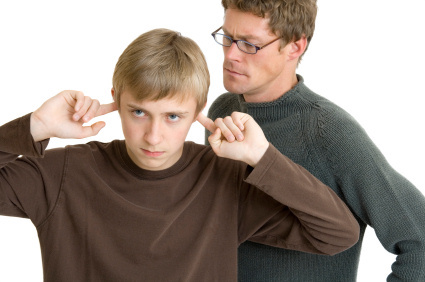Is Your Child Defiant And Does It Even Matter?
/He looked me straight in the eyes and didn't flinch, as if to say, "Go right ahead!"
A prepubescent boy, old enough to know better, was disturbing my peace. A kind talking to him didn't seem to help. A mention of needing to speak with his mother produced no effect.
His behavior was intentional. That part was clear. But why?
The problem is that I had let him get away with disturbing my peace several times before. He's a boy and boys are known to wriggle and tap their feet.
While this particular boy is old enough to know how to sit still when it's asked of him, I chose to ignore it.
Because I decided to be lenient with him, he decided to push me further by entering the land of defiance.
Take note, I erred.
Problem behaviors don't go away; they get worse. What started as slightly annoying behavior quickly grew into intentional defiance.
That's what happens when you don't nip things in the bud.
This situation is a perfect example of how absolutely on top of it you have to be with children to raise them well and have the right relationship with them.
They test you; you teach them right from wrong.
I'm not talking about normal disobedience, as children will be children, but when your child is consistently defiant towards you, you may have a problem.
Here’s some of the ways you can inadvertently encourage defiance in your children:
by positioning yourself as your children's best buddy and therefore, their equal.
Revolving your world around your children and labeling their every little move as "brilliant, amazing, and special
by overlooking substandard behavior instead of adhering to a standard of conduct
I was guilty of the last.
Your child, however much modern psychology would like to convince you otherwise, is not your equal any more than a chick is equal to the hen, or a colt is equal to the mare.
You don't want to treat your children as an equal, nor dote over them, nor ignore repeated misbehaviors.
They may be smaller versions of you, as Charles Shultz said, in the sense that your children share a common humanity with you, but they need to understand that they are the child and you are the adult.
You are wiser, more competent, and certainly worthy of their respect.
You are their parent!
Much of training a child for adulthood takes place in the child's early years. This time of childhood is where you'll help help your children lay the foundation for the rest of their life.
It's why we call the early years the "formative" years.
Your children need a childhood where they are safe, where they are loved, where they are free to roam and play, and where they learn the rules of civil behavior.
Children aren't born with "kind," "humble," and "well-mannered" stamped on their foreheads.
“We cannot live better than in seeking to become better.”
Your children are not going to automatically offer to carry your groceries, help with the dishes, or thank you when you chauffeur them around.
Training in morality is a more critical to living a good life than intellectual training. You're training your child's heart to incline towards making the right choices.
You want to show them the way by leading them with love and authority.
If you do, your children will obey you out of love and respect. Maybe not always, but as a general inclination.
If not, defiance sets in. Your children will adopt the erroneous idea that they are on equal footing with you, and who are you to tell them what to do?
It's not that your children will think to themselves "Oh, my mother and father are so incompetent, why should I listen to them?" as you might think about an incompetent manager who has no authority over his team.
It's more subtle than that. It’s a festering disregard for your authority until they think they know better than you do.
They lose trust in your ability to lead them like you lose trust in an incompetent boss.
Their disrespect will show up in ways you might overlook such as their procrastination in emptying the overflowing garbage when you ask them to, or to put their things away instead of leaving them lying around for you to trip over.
But there's a price you'll pay later for not setting boundaries with your children, and a price they’ll also pay.
Adolescence arrives.
Disempowered parents aren't uncommon today. I see it all the time, as I’m sure you do too.
Adolescence is a strange time in a young person's life, but your home doesn't need to become possessed by demons. It won't always be full of joy and peace, but it shouldn't be hell either.
Who can predict which families will suffer more than others?
If you know what to look for, you'll see there are some strong indicators for impending trouble.
Rather than blame the culture of disrespect—guilty as it is—and point the finger out there, it would do us far more good to look within.
Have you become your children's servant?
This is the red flag you want to look for.
Are your children bossing you around even with little matters like what to have for dinner or when to do their chores?
Are you caving into their demands because they're so cute and funny?
Are they manipulating you into getting their way?
Are they pitting you against your spouse or vice versa?
Are you overlooking their rudeness and disobedience?
Your job is to pass on the knowledge of how to become a civil human being to your children.
Many parents think that being their children's best friend and making sure they are having fun should be the priority in childhood.
But this is faulty thinking. It's not that your children shouldn't have fun, and of course, you naturally want your children to like you, but it isn't the point to childhood.
The point to childhood is to grow up.
If you like this, then do join me for my five-week online course: Preparing Your Child for Genius: The First Seven Years. It starts November 17, 2018. Enrollment closes November 12th at midnight.














